

Karuna - Welcome. Transition MK: Local Initiatives. We are putting together a directory of Transition activity in Milton Keynes.
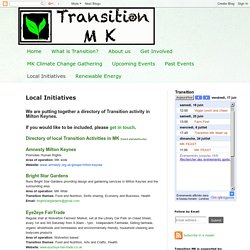
If you would like to be included, please get in touch. Directory of local Transition Activities in MK (listed alphabetically) Amnesty Milton KeynesPromotes Human Rights Area of operation: MK wideWebsite: www.amnesty.org.uk/groups/milton-keynes Bright Star GardensRuns Bright Star Gardens providing design and gardening services in Milton Keynes and the surrounding areaArea of operation: MK Wide Transition themes: Food and Nutrition, Skills sharing, Economy and Business, HealthEmail: brightstargardens@gmail.com Eye2eye FairTradeRegular stall at Wolverton Farmers' Market, set at the Library Car Park on Creed Street, every 1st and 3rd Saturday from 9.30am - 1pm. Global Justice Milton Keynes Global Justice Milton Keynes is a local group of Global Justice Now (formerly The World Development Movement) a national organisation that campaigns against the root causes of poverty and inequality. Can't Afford A Course? - Spiralseed. Can’t afford a Permaculture course?
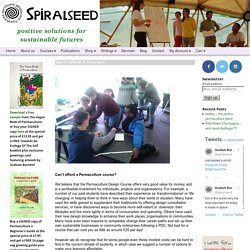
We believe that the Permaculture Design Course offers very good value for money, and is a worthwhile investment for individuals, projects and organisations. For example, a number of our past students have described their experience as ‘transformational’ or ‘life changing’ in helping them to think in new ways about their world or situation. Many have used the skills gained to supplement their livelihoods by offering design consultation services, or have discovered ways to become more self-reliant or ‘downsize’ their lifestyles and live more lightly in terms of consumption and spending.
Others have used their new design knowledge to enhance their work places, organisations or communities. How to Make $100,000 Farming 1/2 Acre You Don't Own. DIY Hydroponic Garden Tower - The ULTIMATE hydroponic system growing over 100 plants in 10 sq feet. Learn How This Family Grows Over 6,000 Lbs Of Food on Just 1/10th Acre. The Dervaes family live on 1/10th of an acre 15 minutes from downtown L.A..

In itself that’s not strange. What’s crazy is that they manage to maintain a sustainable and independent urban farm. Complete with animals! In a year they produce around 4,300 pounds of veggies, 900 chicken , 1000 duck eggs, 25 lbs honey, and pounds of seasonal fruit. There are over 400 species of plants. What the family doesn’t eat they sell from their porch, making around $20,000 a year. Soil and Health Library. Useful Links - Ecology Building Society. We've gathered together a range of links to help you find out more about sustainable living.

Choose a category to find out more. 14 Companion Plants to Repel Beetles and Other Garden Pests. One aspect of companion planting that can be quite useful in the vegetable patch is partnering plants in hopes of repelling certain pests.
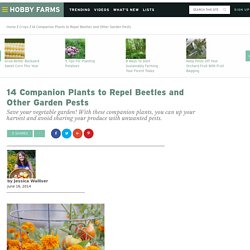
While many pest-deterring companion planting tactics have yet to be scientifically proven, there’s no doubt that several of them are quite effective in deterring certain pests in the garden, even if they’ve only been “proven” via hand-me-down knowledge. Even if a particular pest-deterring plant partnership doesn’t work in your garden, it certainly won’t cause it any harm. Here are a handful of my favorite plants for discouraging pests in the vegetable garden to jumpstart your companion planting endeavors. 1.
Basil Among the most popular partnerships, basil and tomatoes go hand-in-hand—both on the plate and in the garden. 2. 3. 4. 5. 6. 10 Edible Perennial Vines for Vertical Gardening. Vertical gardening is a concept that is well promoted these days, especially when considering urban and suburban gardens in confined spaces.

A quick search on any server will reveal a great collection of reused plastic bottles or PVC pipes suspended alongside walls and fences, little bunches of salad greens poking up periodically. Everything from old pants pockets to upcycled dressers to old pallets are used to grow food beyond just ground level. Often times these create beautiful, if not peculiar, garden touches for people, gardeners and the rest alike, to enjoy. However, small containers like these, while a productive use of space, can often be higher maintenance and are typically used to propagate annuals, but of course, standard permaculture practice is to pursue, though not exclusively, perennial and low-maintenance gardens.
10 Steps to Starting a Community Garden - Food Is Free Project — Over Grow The System. 3.

Identify All Your Resources Do a community asset assessment. What skills and resources already exist in the community that can aid in the garden’s creation? Contact local municipal planners about possible sites, as well as horticultural societies and other local sources of information and assistance. 10 Steps to Starting a Community Garden - Food Is Free Project — Over Grow The System.
A May Full of Initiatives - www.IntegralPermaCulture.org. Living within the destructo-culture, we are pushed to abandon our greatest dreams and let ourselves be dragged by the system's current.
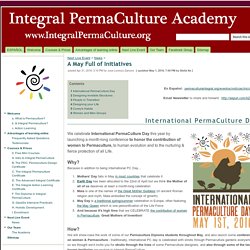
Many of the people who are attracted by Permaculture are youngsters who oppose that current, or who are waking up from going every day to a job that doesn't fulfill them, or frustrated and trapped in unemployment after years of studying. Through many years of teaching Integral Permaculture, especially the most advanced parts of the complete curriculum (Option C and above), we have seen the effectiveness and transformational capacity that having good design tools brings us, especially to help us find our personal life mission (because even when we identify as Permaculture designers, we sometimes have a hard time in finding our particular niche, especially because conventional permaculture is, in some aspects, limiting).
Living the Change: A Documentary Film Series - Happen Films. Living the Change is a series of short documentary films that focus on permaculture, tiny houses, backyard gardeners, natural buildings, simple livers, and anyone with an inspiring story to tell about the transition to a new and more resilient way of life.
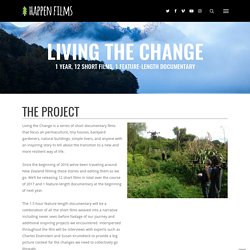
Since the beginning of 2016 we’ve been traveling around New Zealand filming these stories and editing them as we go. We’ll be releasing 12 short films in total over the course of 2017 and 1 feature-length documentary at the beginning of next year. The 1.5 hour feature-length documentary will be a combination of all the short films weaved into a narrative including never seen before footage of our journey and additional inspiring projects we encountered. Interspersed throughout the film will be interviews with experts such as Charles Eisenstein and Susan Krumdieck to provide a big picture context for the changes we need to collectively go through. Living the Change: A Documentary Film Series - Happen Films.